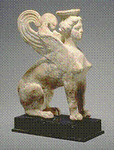Many years ago, my mother gave me a set of books called Great Books of the Western World, 54 volumes of literature, history, social sciences, mathematics, natural sciences, philosophy and theology, by authors, ranging from Homer to Freud, over the course of 25 centuries. In explaining the purpose of gathering these works into one set, the editors talked about The Great Conversation, meaning the exchange of ideas and advancement of knowledge made possible by studying the work of great thinkers of the past, and developing on the ideas presented therein.
I bring this up because recent discussions of blogging among some of my blog-colleagues (for whom I am coining the term blolleagues)--Charles Gramlich, Stewart Sternberg--have sparked my own ideas about the purposes and results of weblogs.
The growth of the weblog--i.e., blog--in the past five years has been truly astonishing. There are millions of them in cyberspace. These blogs cover nearly any topic you can think of. Bloggers have formed communities of interest (e.g., writing, books, literature). I didn't start reading blogs until about a year ago, when I happened upon one via a website link. That first blog was Booksquare. From links on Booksquare, I found other blogs by writers and readers (my primary areas of interest in cybersurfing). I read, and learned from, many different blogs, and eventually developed the desire to have a weblog of my own.
Now that I have joined the ranks of bloggers, and had a couple of months of experience in posting on my own blog, as well as commenting on others' blogs, I realize that the world of blogging is another type of Great Conversation. Bloggers and their readers interact worldwide; anyone with access to the Internet and the World Wide Web can read one's blog. It is indeed a Great Conversation, an exchange of ideas among people with whom one likely will never have any other type of contact. The thoughts exchanged may seldom be as profound as those in the Great Books' Great Conversation--but nevertheless, they are a Conversation, and an exposure to ideas beyond one's own narrow circle.
I am profoundly glad to be living in the age of cyberspace.
P.S. The Great Books of the Western World set is still being sold by Encyclopedia Brittanica. The price has tripled in the several decades since my set was purchased.
Tuesday, December 26, 2006
Subscribe to:
Post Comments (Atom)




3 comments:
If I may wax poetic, and it is better to wax poetic than to wax hairless, don't ask....Susan Miller made an comment that resonates with me. She called blogs and all those who blog and comment, participants in the Great American Novel.
I like the idea that we are all involved in a "Great Conversation." I have to agree.
Sphinx Ink agrees with Sternberg: It's much better to wax poetic than to wax hairless...waxing hairless is painful. Waxing poetic causes no pain to the poet, although it sometimes injures those who listen to/read the poem.
Post a Comment